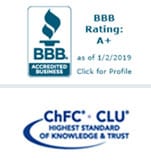![]()
Year-end tax planning can help you take advantage of the sweeping changes contained in the Tax Cuts and Jobs Act. Whether it means limiting your tax liability, increasing your refund, or saving on your tax bill, a short meeting with your tax advisor before December 31st will allow you to strategize your financial decisions to make the most of the 2018 tax overhaul. Your tax-planning appointment should answer these four questions:
Do I Need to Itemize?
To itemize or not to itemize—for many taxpayers, this is the most important question. One of the frequently discussed adjustments in the tax code is a new standard deduction, which is now $12,000 for single filers and $24,000 for joint filers. At the same time, several popular itemized deductions have been removed or reduced, including deductions for home equity loan interest, work-related expenses, and state and local taxes, also known as the SALT tax break.
The result? If you itemized in the past, you might be better off claiming the standard deduction. To determine which deductions will save you the most, you and your tax advisor will compare the new standard deduction to the itemized tax deductions you have been eligible to claim in the past and those you will be entitled to under the new legislation. If it is still unclear and you could really go either way, you may benefit from squeezing in a few last-minute deductions so that you get the most out of itemizing this year and can still claim the standard deduction next year.
However, if you pay the Alternative Minimum Tax, this strategy could backfire. That’s why it’s important to work with a professional who understands the in’s and out’s of the IRS code.
Am I Withholding Enough (Or Too Much)?
The Tax Cuts and Jobs Act included new withholding tables to adjust for lower tax rates and the increased standard deduction, but since the bill’s enactment in late 2017, the new tables have been causing headaches for employers and employees alike.
On one hand, the bill’s timing meant that the new tables were not put into effect until March 2018, and so employers who procrastinated on updating their payroll may have caused their employees to experience over-withholding. On the other, the new tables failed to adjust for the loss of itemized deductions meaning that taxpayers may experience under-withholding if they did not proactively adjust their estimated tax payments and withholding themselves.
Review your estimated tax payments and withholding immediately to make sure you’re on track.
What Should I Do With My Investments?
Selling off depreciated assets to save on taxes is a classic year-end strategy. The trick here has always been timing: do you sell this year to balance out capital gains, which are taxed at a maximum of 20%, or another year, when you do not have capital gains. and the losses can offset regular income, which might be taxed at a higher rate? Similarly, taxpayers who exercised stock options that they received from an employer could be hit with the Alternative Minimum Tax. If the options have seen a large drop in value, it might be a good idea to sell them. However, with the Tax Cuts and Jobs Act, employees below a certain income threshold can choose to defer tax on stock options for up to five years.
How Should I Handle My RMD’s?
If you are 70 ½ or older, you are required to withdraw a certain taxable amount from your tax-deferred retirement accounts each year. This transaction is called a required minimum distribution (RMD). Failing to take your RMD before the December 31st deadline can be ugly; when you do finally take it, the IRS will extract 50% of the withdrawal as a penalty. With the new tax legislation, you have an opportunity to set up your RMD as a direct donation to a charity. This move, called a qualified charitable distribution, will go to the charity tax-free—equating to a 100% deduction.
Ready to take advantage of these and other tax-saving strategies? We can help. Request your free year- end tax planning consultation here.


Sara McKinney
saractag@gmail.com
Sara is a recent graduate of Kalamazoo College and a new addition to the Cowen Team. Her responsibilities include IT support, digital content creation, and database maintenance.




